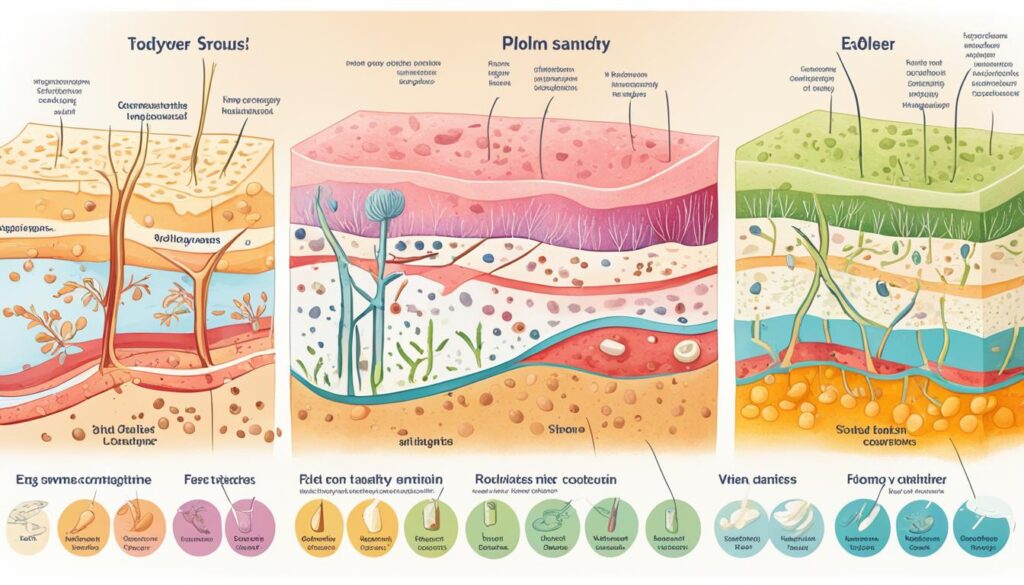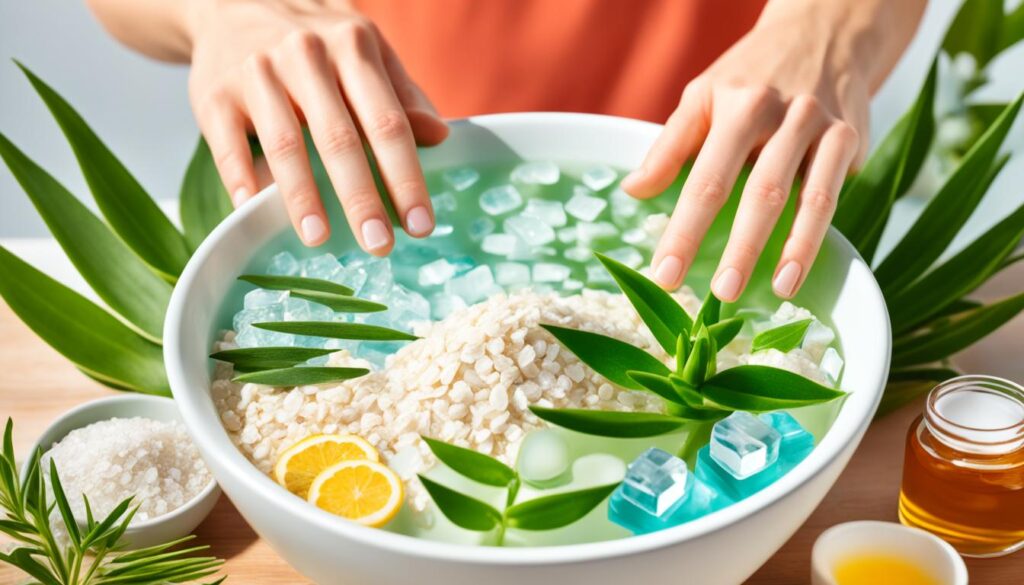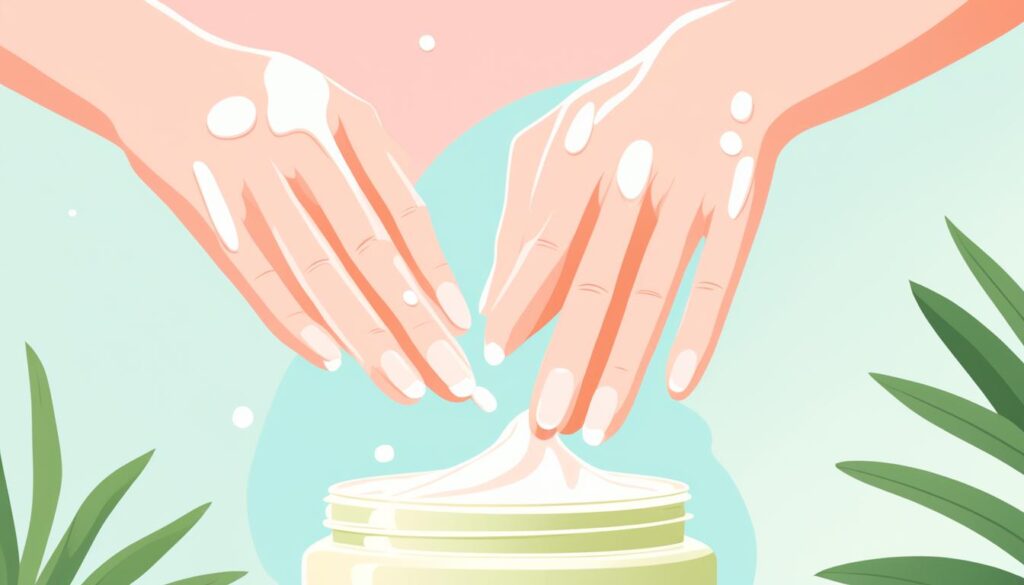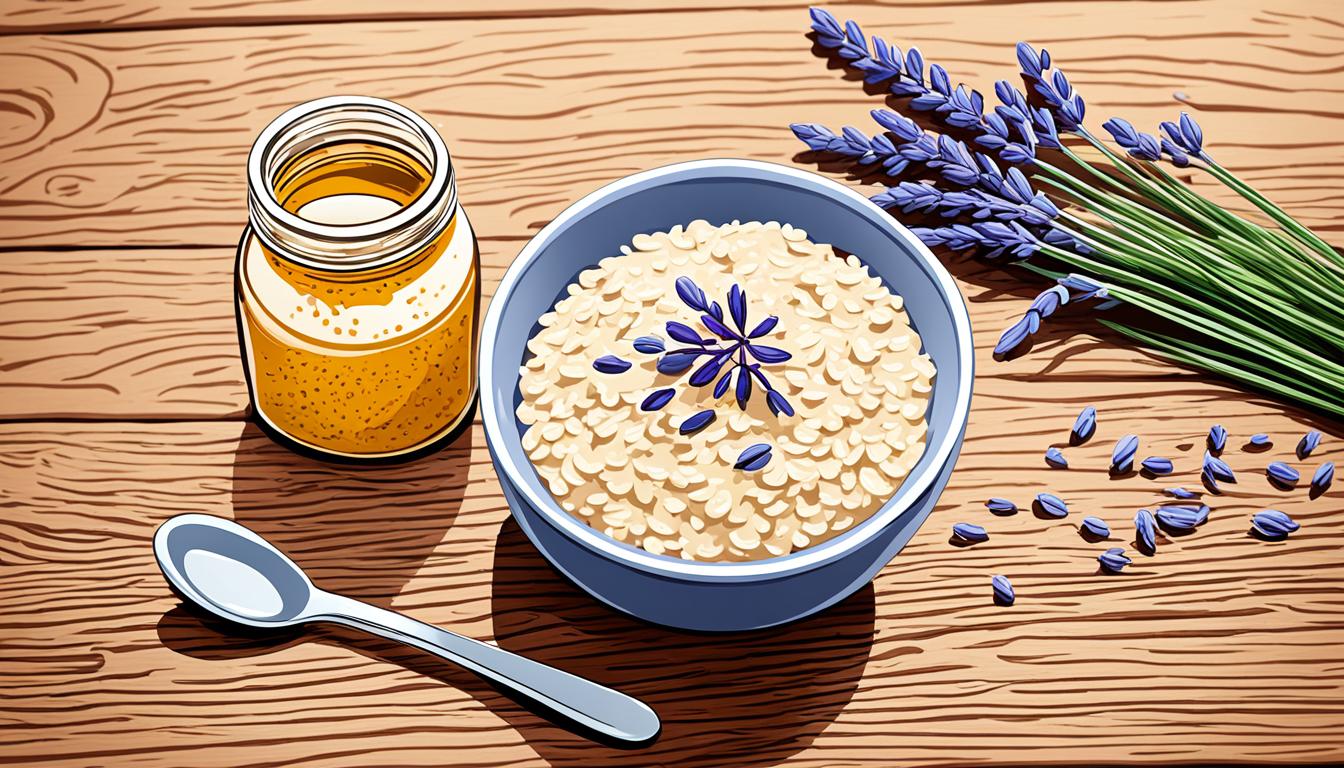Itchy skin can be really annoying and uncomfortable. Luckily, there are many home remedies that can help. These remedies offer quick and natural relief for your itchy skin. They work well for allergic reactions, skin conditions like eczema or psoriasis, and irritation from the environment.
Key Takeaways
- Understand the common causes of itchy skin, including allergic reactions and skin conditions.
- Identify and avoid potential triggers that can worsen your itchy skin.
- Explore the benefits of using coconut oil, honey-based creams, and other natural home remedies.
- Maintain proper skin hydration throughout the day to alleviate itchiness.
- Switch to gentle, fragrance-free products to avoid further irritation.
Understand the Causes of Itchy Skin
Itchy skin can be a real nuisance. Knowing what causes it is key to finding relief. Many things can make your skin itch, from dry air to certain skin conditions.
Common Triggers and Conditions
Dry skin is a top reason for itchiness. Without enough moisture, your skin gets irritated and itches. Things like cold air or harsh soaps can make it worse.
Conditions like eczema, psoriasis, and dermatitis also cause a lot of itching.
Allergic Reactions and Insect Bites
Allergies to food, pollen, or other things can make your skin itch. Your body’s reaction can lead to rashes and constant itching. Insect bites, like from mosquitoes, can also make you itch.

Knowing what causes your itchy skin is important for finding relief. It could be dry skin, a skin condition, or an allergic reaction. Figuring out the cause helps you find the right treatment.
Identify and Avoid Itch Triggers
Understanding your itch triggers is key to preventing itchy skin flare-ups. By knowing what causes your skin to itch, you can avoid those triggers. This helps keep your skin comfortable and itch-free.
Dry air is a common cause of itchiness. Using a humidifier can add moisture to your home and soothe dry skin. Also, wearing breathable, natural fabrics can help. Synthetic materials can irritate sensitive skin.
- Identify personal itch triggers, such as dry air, certain foods, or irritating fabrics
- Use a humidifier to add moisture to indoor environments and prevent dry skin
- Opt for breathable, natural fabrics in your clothing and bedding
Understanding and avoiding your itch triggers can help prevent flare-ups. By being vigilant and making small changes, you can keep your skin healthy and itch-free. This approach can lead to long-term relief from itchy skin.

Apply Coconut Oil for Moisture and Relief
If you’re dealing with itchy skin, coconut oil might help. This natural oil is known for soothing irritated skin, especially for those with mild eczema. Its antimicrobial and antibacterial qualities make it a top pick for gentle, effective relief.
Potential Benefits and Precautions
Using coconut oil for itchy skin comes with both good points and things to watch out for. Virgin coconut oil is often suggested for its purity and ability to nourish the skin. But, some folks might be allergic or sensitive to it, causing more irritation. Always test a small area of skin before using it on your whole body.
If you’re not sure about using coconut oil for your skin, talk to your doctor. They can look at your specific situation and suggest the safest, most effective way to use coconut oil in your skincare routine.
- Coconut oil may help soothe itchy skin due to its antimicrobial and antibacterial properties
- Virgin coconut oil is often recommended for its nourishing benefits
- Some people may be allergic or sensitive to coconut oil, so it’s important to do a patch test
- Consult with your healthcare provider before using coconut oil for itchy skin conditions
Knowing the good and bad of using coconut oil for itchy skin lets you make a smart choice. Always put your skin’s health and comfort first when trying home remedies.

Home remedies for itchy skin
Dealing with itchy skin can be frustrating. But, you don’t have to only use over-the-counter remedies. Natural home treatments can give you quick and lasting relief. Coconut oil is one option, but there are others too.
One easy fix is an oatmeal bath. Oatmeal has soothing properties that can lessen inflammation and ease itching. Just add a cup of oatmeal to your bathwater and soak for 15-20 minutes.
Keeping your skin moisturized is also important. Use gentle, fragrance-free moisturizers that won’t irritate your skin more. Creams with honey are great because honey fights bacteria and reduces swelling.
- Oatmeal baths to calm inflammation
- Gentle, fragrance-free moisturizers for hydration
- Honey-based creams to soothe and protect
Using these natural remedies can help you manage itchy skin without harsh chemicals. Try different options to see what works best for you.

Moisturize Throughout the Day
Keeping your skin hydrated is key when you have itchy skin. Moisturizing often helps prevent dryness and irritation. Choose gentle, fragrance-free moisturizers to avoid making things worse.
Tips for Effective Moisturizing
For best results, put on a lot of your favorite moisturizer within 3-5 minutes after showering or bathing. This locks in moisture and soothes itchy skin. Also, keep a travel-size moisturizer handy to reapply throughout the day, especially after activities that dry out your skin.
Consistency is important for applying moisturizer on itchy skin. Try to moisturize at least twice a day, once in the morning and once before bed. This regular routine can greatly improve your skin’s hydration and comfort.

Proper moisturizing is crucial for managing itchy skin. By following these tips daily, you can soothe and nourish your skin. This brings much-needed relief from itchiness.
Switch to Gentle, Fragrance-Free Products
Dealing with itchy skin means being careful with what you put on your body. Using products without fragrances can really help. These products are less likely to irritate your skin and make itching worse.
Try switching to gentle, fragrance-free items. Look for cleansers, laundry detergents, and fabric softeners made for sensitive skin. They don’t have ingredients that can irritate your skin, helping it heal.
Choosing products without fragrances and other additives can reduce irritation. This helps your skin recover from itchiness. Stick to products that are gentle and free from harsh chemicals.
Being careful with what you use on your skin can really help with itching. Opt for gentle, fragrance-free products. This supports your skin’s healing and gives you the relief you need.
Use Honey-Based Creams
If you’re dealing with itchy skin, think about adding honey-based creams to your skincare routine. Honey is known for its antimicrobial and anti-inflammatory qualities. These can help soothe and calm itchy skin.
Studies have looked into honey’s benefits for the skin. While more research is needed, the results are encouraging. Honey-based creams could reduce skin bacteria and ease itchiness.
Honey-infused products are a gentle, natural choice compared to harsh chemicals. Using them regularly might ease the discomfort of eczema, psoriasis, and bug bites.
Adding honey-based skincare to your routine is easy and might help with itchiness. Always test new products on a small area first. If your symptoms get worse, talk to a healthcare professional.
The Benefits of Honey for Itchy Skin
- Antimicrobial properties that may help reduce bacteria on the skin
- Anti-inflammatory effects that can soothe irritated, itchy skin
- Moisturizing qualities that can help replenish the skin’s natural barrier
- Natural healing properties that may promote the skin’s regeneration
Looking for a natural way to ease itchy skin? Try honey-based creams and lotions. They offer potential benefits and soothing effects. These products could be the answer to comfort and improve your skin’s health.
Utilize Humidifiers and Cold Compresses
Humidifiers and cold compresses are simple yet effective ways to soothe itchy skin. They add moisture to the air and cool the skin, offering much-needed relief.
Benefits of Added Moisture
Dry air can make itchy skin worse, especially when it’s cold and heaters are on. A humidifier for itchy skin adds moisture back into the air. This helps hydrate the skin and lessen irritation.
Cooling Relief with Cold Compresses
Using a cold compress for itchy skin can be very soothing. The cool touch reduces inflammation and makes the skin feel calm. You can use a cool washcloth, ice pack, or even refrigerated aloe vera gel for relief.
Using a humidifier and cold compress together can be a great way to ease itchy skin. They add moisture and cool the skin, helping to reduce discomfort and aid in healing.
Conclusion
Dealing with itchy skin can be really frustrating. But, you have many natural home remedies to help. Using coconut oil, taking oatmeal baths, and using humidifiers can bring quick relief. If your itching is severe or lasts a long time, see a healthcare professional for help.
Understanding what causes your itchy skin and avoiding triggers can help. Adding these home remedies to your daily routine can improve your skin’s health. Always listen to your body and get medical help if the itching doesn’t go away or gets worse.
Being proactive and trying different remedies is key. By taking a holistic approach, you can find the best solution for your itchy skin. So, try these home remedies and take care of your skin today.
FAQ
What are the common causes of itchy skin?
Itchy skin can come from many things. This includes allergic reactions, skin issues like eczema or psoriasis, or chemicals in cosmetics. Hormonal changes during pregnancy can also cause it.
How can I identify and avoid triggers for my itchy skin?
Knowing what makes your skin itch is key. This could be dry air, certain foods, or rough fabrics. Try to avoid or manage these triggers to stop itchy skin.
What are the benefits of using coconut oil for itchy skin?
Coconut oil can help with itchy skin because it has natural antimicrobial and antibacterial properties. It’s especially good for mild eczema. But, some might be allergic or find it too harsh, so test it first.
What other home remedies can provide relief for itchy skin?
Besides coconut oil, other home remedies work well. Try oatmeal baths, moisturize often, and use gentle, fragrance-free products. Honey-based creams can also help.
When should I consult a healthcare professional for my itchy skin?
See a doctor if the itching is bad, lasts a long time, or has other worrying signs. They can check and treat you properly.





Leave a Comment